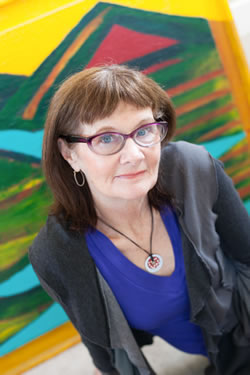|
Many years ago, I received a letter from someone who'd read and almost loved my first novel, The Blue Chair. The writer was a gay man and he was sad that what he perceived to be my lack of compassion for a character he perceived to be gay kept him from surrendering to a work he otherwise admired.
Within the confines of the text, Jason Harmon was a cold and troubled man. In my writer's mind, he was asexual. To my reader, though, Jason was deep in the closet and I had put him there. The letter was so heartfelt, so essentially kind in its intention—please be a better person!—that it led me to think hard about who I wanted to be as a writer, how I wanted to affect the fellow human beings who invest their time and attention in my fictions. It shamed me. And it acted as both mandate and permission to write beyond the constraints of my resume, my body, my beliefs, my comfort zone.
My assignment became not to write what I knew, but what I was capable of imagining.
Changing the assignment changed my aspirations. Till then, I had wanted to be able to make readers laugh, cry, and think. Now I amended my wish list: I want to make people identify beyond the furthest outposts of their prejudices.
Which meant, of course, that I had to do it myself.
To write beyond the boundaries of a self embedded in personal history requires research, an intellectual discipline that gives the writer the illusion of being in control, as well as a license to be ruthlessly snoopy. The conscious quest for details and insights authentic to the other is the writer's walking stick on a journey beyond self, something to plant firmly and hold tight when things start getting weird. They will get weird, because the second requirement of imagining instead of just reporting is surrender. To write as and for someone else means giving up the self and putting the psyche at risk. The rewards and the dangers are equally great—expansion or unraveling.
In the course of writing six novels, I've experienced both.
The writers I most admire take these dangerous journeys. What they bring back to the rest of us is magical, a pill that makes us big or small, old or young, man or woman, straight or gay, good or evil or better yet, a paradoxical amalgam more convincing than most of the "real" fellow humans who wander through our lives. Their acts of sustained empathy, of feeling as, take my breath away—Vasily Grossman, as an example, offering his artist's witness of the siege of Stalingrad, becoming and hence making us become heroes and cowards, interrogators and victims, apparatchiks and dissidents, academics and peasants, old guard revolutionaries and new-line Stalinists, Nazi commandants and ditch diggers and the boxcar full of Jews fooled for one blessed moment into believing that "shower" is a gift of hygiene and not a code word for annihilation. Because Grossman was willing to walk into the gas chambers with them, so too must we.
Grossman is a stunning instance, but not a solitary one. Recent transformative journeys I've taken have been in the company of Orhan Pamuk, Amitav Ghosh, Toni Morrison, Hilary Mantel. The best writers among us occupy the other so we can, too.
To name these writers is not to suggest I am their equal, but to affirm the power of their work and the value of their example—it's okay to be a shape shifter, an other-becomer. It may seem politically incorrect, even pathological that I, a straight white mom who's spent most of her life in the US middle class, presents herself on the page as man, woman, white, black, hermaphrodite, drag queen, whole, damaged, well and ill, but in the alternate universe of the fiction writer, it's normal. I have friends and family who refuse to travel with me. They don't want to know whom I'm willing to become.
I don't blame them, only recognize that it's not for them I write. In fact, I suspect I'm still writing for the young gay man who cared enough to call out my shortfall of empathy.
Finally, a few pointers for writers willing (or driven) to transcend and transgress and maybe, thereby, to transform.
- Listen for the voice that knows the story. Once it starts to speak inside your head, you can make ready to embark.
- Don't set out without a safe harbor to return to on a daily basis.
- Be good to the body you're escaping.
- Put everything you know about the craft of writing in your backpack and bring it with you.
- Share the journey with a trusted reader.
- When you have a draft, put it in the hands of the other. Seek scrutiny, ask rude questions, listen with all your senses to what is said. This is a conversation you've risked much to have.
|


